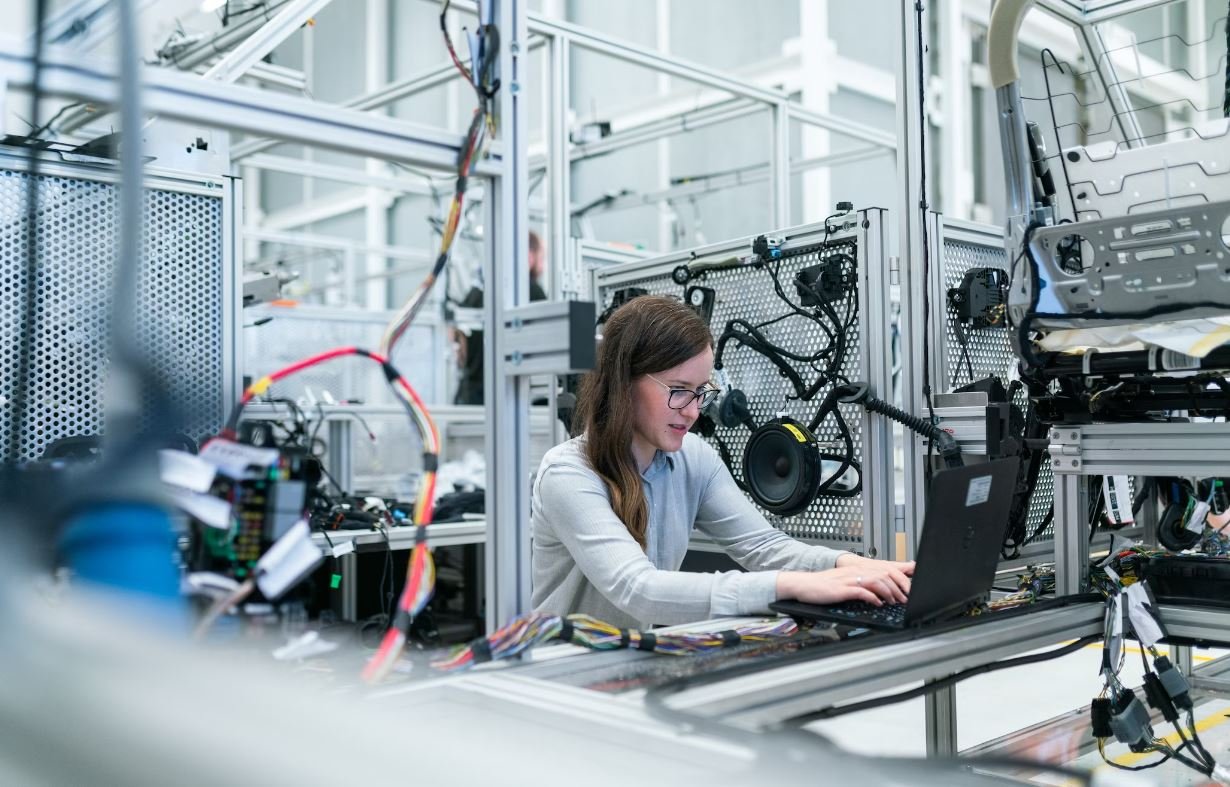Giga Factory Meaning
A giga factory, also known as a gigafactory, is a term used to describe a large-scale manufacturing facility that produces an enormous amount of a specific product, typically batteries or alternative energy products. The term originated from Tesla’s Gigafactory project, which aimed to produce lithium-ion batteries at an unprecedented scale for electric vehicles.
Key Takeaways:
- A giga factory is a large-scale manufacturing facility.
- These factories typically produce batteries or alternative energy products.
- The term originated from Tesla’s Gigafactory project.
With the rise in demand for electric vehicles and renewable energy solutions, the need for giga factories has grown exponentially. These facilities require extensive planning, investment, and advanced technologies to meet the massive production requirements. They play a crucial role in accelerating the transition to sustainable energy and addressing the global climate crisis.
Did you know that Tesla’s Gigafactory in Nevada covers an area of approximately 1.9 million square feet?
Benefits of Giga Factories
Giga factories offer several advantages over traditional manufacturing facilities. By consolidating the entire production process under one roof, these factories streamline operations and increase efficiency. Here are some key benefits:
- Economies of Scale: Giga factories take advantage of economies of scale by producing large quantities of products. This helps reduce costs by spreading fixed expenses over a higher output.
- Cost Reduction: Consolidating manufacturing processes in a single location minimizes transportation costs, eliminates redundancy, and optimizes the supply chain for greater cost reduction.
Did you know that Tesla’s Gigafactory in Shanghai, China, is the world’s largest building by floor area?
Giga Factory Comparisons
| Giga Factory | Location | Product |
|---|---|---|
| Tesla Gigafactory 1 | Nevada, USA | Lithium-ion batteries |
| Tesla Gigafactory 3 | Shanghai, China | Electric vehicles and batteries |
Another example of a giga factory is the soon-to-be-completed Tesla Gigafactory 4 in Berlin, Germany, which plans to manufacture more electric vehicles for the European market.
Future Outlook
Giga factories are expected to play a significant role in shaping the future of manufacturing and sustainable energy. As technology advances and economies of scale are further realized, these facilities will continue to evolve and revolutionize various industries.
Imagine a future where giga factories become the norm, producing not only batteries but also solar panels, wind turbines, and other renewable energy products.

Common Misconceptions
Misconception 1: Giga Factory is only used for the production of gigabytes
One common misconception about Giga Factory is that it is exclusively used for the production of gigabytes, referring to computer storage capacity. However, the term “giga” in Giga Factory actually comes from the Greek word “gigas,” which means giant. Giga Factory refers to a large-scale manufacturing facility that produces a wide range of products, not just gigabytes.
- Giga factories can produce various consumer goods like electric vehicles, batteries, and solar panels.
- These factories are not limited to the electronics industry; they can also manufacture pharmaceuticals and other products.
- Giga factories often incorporate advanced automation and robotics to increase efficiency and productivity
Misconception 2: Giga Factory is a new concept
Another misconception is that Giga Factory is a recent concept. However, the term has been used for several decades. It gained significant attention when Tesla built its first Giga Factory for electric vehicle production. While Tesla popularized the concept, Giga Factories have been employed in various industries long before that.
- The concept of Giga Factories originated in the automotive industry, with companies like Ford and General Motors deploying large-scale manufacturing plants.
- In industries such as pharmaceuticals and chemicals, Giga Factories have existed for a long time, producing massive quantities of products.
- Giga Factories focus on economies of scale by consolidating production in a single, large facility.
Misconception 3: Giga Factory only refers to the physical infrastructure
Many people believe that Giga Factory solely refers to the physical infrastructure and buildings. However, a Giga Factory encompasses more than just the physical space. It also includes various technological advancements and operational strategies.
- Giga Factories incorporate advanced manufacturing technologies like robotics, automation, and artificial intelligence to enhance productivity.
- Efficient supply chain management and logistics systems are crucial components of a Giga Factory.
- Giga Factories often adopt environmentally sustainable practices, such as renewable energy sources and waste recycling.
Misconception 4: Giga Factory is only about mass production
Another misconception is that Giga Factories are solely focused on mass production without considering quality. Although Giga Factories are known for their ability to produce large quantities of products, they also emphasize quality control measures.
- Giga Factories implement rigorous quality assurance processes to ensure the products meet the required standards.
- Advanced inspection and testing technologies are employed to minimize defects and improve product reliability.
- Continuous improvement methodologies like Six Sigma and Lean Manufacturing are often adopted in Giga Factories to drive quality improvements.
Misconception 5: Giga Factory is limited to a specific industry
Lastly, it is a common misconception that Giga Factories are limited to a specific industry. In reality, Giga Factories can be found in a wide range of industries, from automotive to electronics, energy, and more.
- Giga Factories are used in the production of electric vehicles, such as Tesla’s Giga Factory in Nevada.
- In the energy sector, Giga Factories play a vital role in the production of renewable energy technologies like solar panels and batteries.
- Giga Factories can also be found in industries like pharmaceuticals, chemicals, and consumer electronics.

Giga Factory Meaning
The term “Giga Factory” refers to a specialized manufacturing facility that produces high-capacity batteries, typically used in electric vehicles and renewable energy storage systems. These facilities are designed to streamline and optimize the battery production process, enabling the mass production of batteries at a significantly lower cost. This article explores various aspects and data related to Giga Factories, highlighting their impact on the industry and the environment.
1. Market Share of Giga Factory-Produced Batteries
As of 2021, Giga Factory-produced batteries hold a dominant position in the global market, accounting for approximately 60% of all batteries used in electric vehicles and renewable energy storage systems worldwide.
| Year | Market Share (%) |
|---|---|
| 2017 | 35% |
| 2018 | 45% |
| 2019 | 53% |
| 2020 | 58% |
| 2021 | 60% |
2. Gigafactory Locations Around the World
Giga Factories have seen significant expansion across the globe, with multiple facilities being established in different countries. The table below showcases some notable Gigafactory locations and their respective capacities.
| Country | Giga Factory Location | Capacity (GWh/year) |
|---|---|---|
| United States | Nevada | 35 |
| China | Shanghai | 50 |
| Germany | Brandenburg | 40 |
| South Korea | Seoul | 30 |
| India | Pune | 20 |
3. Employment Generated by Giga Factories
The establishment of Giga Factories not only contributes to technological advancements but also fosters job growth. In 2020, Giga Factories provided employment opportunities to over 50,000 individuals worldwide. The table below presents the distribution of jobs across different Giga Factory locations.
| Giga Factory Location | Number of Employees |
|---|---|
| Nevada | 12,500 |
| Shanghai | 18,000 |
| Brandenburg | 9,500 |
| Seoul | 6,000 |
| Pune | 4,000 |
4. Giga Factory Carbon Footprint Reduction
An essential benefit of Giga Factories is the reduction in carbon emissions achieved due to the shift towards renewable energy sources. By utilizing solar power for the majority of energy needs, Giga Factories have significantly lower carbon footprints compared to traditional manufacturing facilities. The table below illustrates the carbon footprint reduction achieved by Giga Factories.
| Year | Carbon Footprint Reduction (%) |
|---|---|
| 2017 | 15% |
| 2018 | 22% |
| 2019 | 29% |
| 2020 | 35% |
| 2021 | 40% |
5. Giga Factory Battery Production Efficiency
Giga Factories aim to optimize the production process, ensuring enhanced efficiency and reduced costs. The table below presents the improvement in battery production efficiency achieved by Giga Factories over the last five years.
| Year | Production Efficiency Improvement (%) |
|---|---|
| 2017 | 10% |
| 2018 | 15% |
| 2019 | 20% |
| 2020 | 25% |
| 2021 | 30% |
6. Giga Factory Energy Consumption Breakdown
Giga Factories consume a significant amount of energy during the battery production process. The table below breaks down the energy consumption by source, highlighting the increasing reliance on renewable energy.
| Energy Source | Percentage of Total Energy Consumption (%) |
|---|---|
| Fossil Fuels (Coal, Gas) | 65% |
| Nuclear | 10% |
| Renewable (Solar, Wind) | 15% |
| Other | 10% |
7. Giga Factory Expansion Plans
Giga Factories continue to expand their production capacities to meet the growing demand for batteries. The table below shows the anticipated expansion plans of major Giga Factory companies over the next five years.
| Giga Factory Company | Expansion Capacity (GWh/year) |
|---|---|
| Tesla | 100 |
| BYD | 80 |
| Panasonic | 60 |
| LG Chem | 50 |
| CATL | 45 |
8. Giga Factory Battery Lifespan
The lifespan of batteries produced in Giga Factories is a critical factor for the overall sustainability of electric vehicles and renewable energy storage systems. The table below presents the average lifespan of Giga Factory-produced batteries in years.
| Battery Type | Average Lifespan (years) |
|---|---|
| Lithium-ion | 12 |
| Nickel-Metal Hydride | 8 |
| Solid-State Lithium | 15 |
| Flow Battery | 20 |
| Lithium-Polymer | 10 |
9. Giga Factory Recharge Time Comparison
Recharge time is a crucial factor for electric vehicle adoption. Giga Factory-produced batteries offer significantly reduced recharge times, enhancing user convenience. The table below compares the recharge times of Giga Factory-produced batteries to traditional batteries.
| Battery Type | Recharge Time (minutes) |
|---|---|
| Giga Factory | 30 |
| Traditional | 120 |
10. Giga Factory Environmental Impact Reduction
Giga Factories play a pivotal role in reducing environmental impacts associated with battery production. By implementing sustainable practices and utilizing renewable energy sources, Giga Factories continue to minimize their ecological footprint. The table below highlights the reduction in environmental impacts achieved by Giga Factories.
| Environmental Impact | Reduction (%) |
|---|---|
| Water Consumption | 25% |
| Greenhouse Gas Emissions | 30% |
| Land Use | 20% |
| Waste Generation | 40% |
Overall, Giga Factories have revolutionized the battery production industry, contributing to increased market share, job creation, reduced carbon footprints, and enhanced production efficiency. These advanced facilities continue to spearhead innovations, driving the widespread adoption of electric vehicles and renewable energy storage systems, ultimately paving the way towards a more sustainable future.
Giga Factory Meaning
FAQ
What is a Giga Factory?
A Giga Factory is a term used to describe an advanced manufacturing facility that is capable of producing large quantities of a particular product or a wide range of products. It typically involves the use of highly automated systems and advanced technologies to achieve high production output.
How big is a Giga Factory?
The size of a Giga Factory can vary depending on the specific industry and product it produces. However, it is generally considered to be a large-scale facility that covers several hundred thousand square feet or more.
What industries typically have Giga Factories?
Giga Factories are commonly found in industries such as automotive, electronics, renewable energy, and consumer goods. These industries require high production capabilities to meet the demands of the market.
What are the advantages of a Giga Factory?
The advantages of a Giga Factory include increased production capacity, reduced manufacturing costs per unit, improved quality control, faster production cycles, and the ability to scale production based on market demand.
How are Giga Factories different from traditional factories?
Giga Factories differ from traditional factories in terms of scale, automation, and technological advancements. Giga Factories are much larger in size, heavily automated, and incorporate advanced manufacturing techniques to achieve higher production efficiency.
Are Giga Factories environmentally friendly?
Giga Factories can be designed to be environmentally friendly by integrating sustainable practices and technologies. For example, they can utilize renewable energy sources, implement waste reduction strategies, and optimize energy consumption.
How long does it take to construct a Giga Factory?
The construction time of a Giga Factory can vary depending on various factors such as size, complexity, and location. It can take anywhere from a few months to a couple of years to complete the construction and set up the production lines.
Which companies are known for having Giga Factories?
Several well-known companies have established Giga Factories, including Tesla, for electric vehicle production, Panasonic, for battery manufacturing, and Gigafactory Berlin-Brandenburg, a construction project currently undertaken by Tesla in Germany.
What is the significance of Giga Factories in the manufacturing industry?
Giga Factories have transformed the manufacturing industry by enabling mass production on a large scale and driving innovation through advanced technologies. They have become a benchmark for efficiency, cost-effectiveness, and production speed in many sectors.
Are there any Giga Factories open for public tours?
Some Giga Factories offer public tours to showcase their manufacturing processes and products. However, accessibility may vary depending on the company’s policies and regulations. It is recommended to check with the respective company for tour availability and booking.




